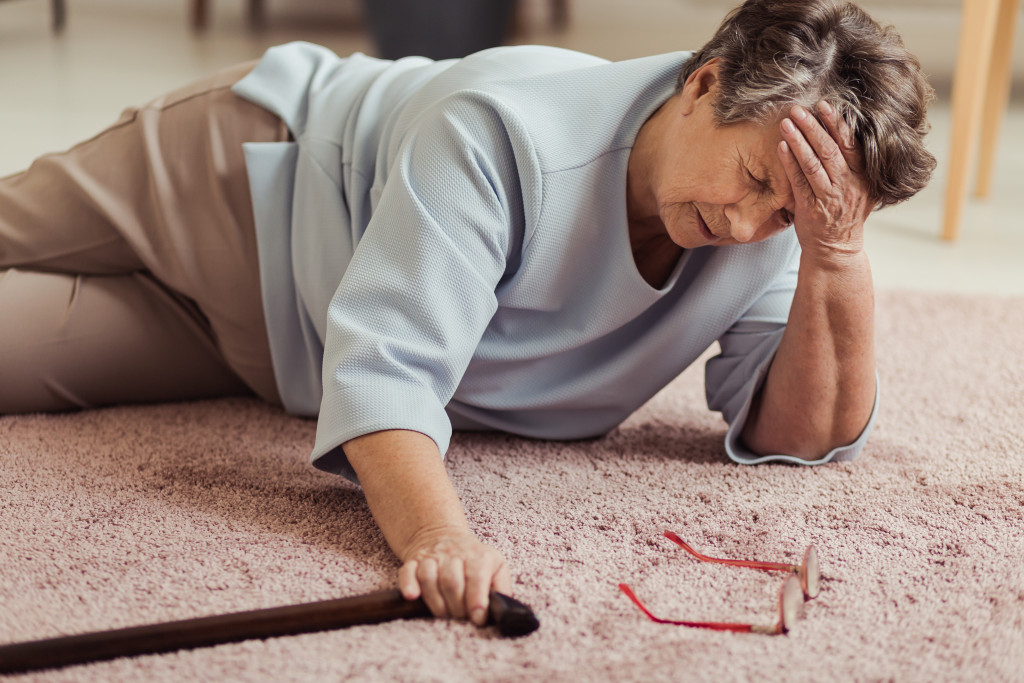- Vision impairment can cause trips, slips, or falls because of difficulty seeing obstacles and hazards.
- The home environment can lead to falls due to loose rugs, clutter, poor lighting, or uneven flooring.
- Chronic health conditions such as arthritis, Parkinson’s disease, or muscle weakness can increase the risk of falls.
- Poor nutrition can lead to muscle weakness and other health problems, increasing fall risk.
As people age, their risk of falling and sustaining an injury increases. Unfortunately, falls are a leading cause of injury, hospitalization, and even death in older adults. Understanding the risk factors for falls and prevention strategies to help keep seniors safe and healthy is important. Here are the most common risk factors for falls and provide tips for preventing fall-related injuries.
Vision
Impaired vision is another common risk factor for falls among seniors. Poor vision can make it difficult to see obstacles and hazards, leading to trips, slips, and falls. If you’re noticing changes in your vision, see your eye doctor regularly and wear corrective lenses as directed.
Home Environment

Home hazards can lead to falls among seniors. Loose rugs, clutter, poor lighting, and uneven flooring are all examples of potential hazards in the home. Moreover, if the stairs are not fitted with handrails, this can be a significant risk factor for falls.
To reduce the risk of falls in your home, remove any tripping hazards and install battery-operated lift chairs for older people if they have difficulty getting up and down stairs. Lift chairs are an excellent way to reduce the risk of falls and keep seniors safe.
Physical Condition
Chronic health conditions, such as arthritis, Parkinson’s disease, and muscle weakness, can increase the risk of falls. Regular exercise, including balance and strength training, can help reduce the risk of falls. Physical therapy may also be recommended to improve overall health and mobility.
Nutrition
Poor nutrition can lead to muscle weakness and other health problems, increasing the risk of falls. Seniors should maintain a healthy diet of fruits, vegetables, lean proteins, and whole grains. Be sure to stay hydrated and limit caffeine and alcohol, which can contribute to dehydration and increase the risk of falling.
Foods high in Vitamin D and calcium, such as salmon and fortified orange juice, can also help reduce the risk of falls by improving bone health.
Medications

As a caregiver or family member of a senior loved one, it’s essential to understand the hidden risks that can increase an old’s risk of falling. One overlooked factor is medications. Certain drugs can make seniors more likely to stumble, lose their balance, or feel dizzy, leading to falls.
Dizziness and Lightheadedness
One of the most common side effects of medications is dizziness or lightheadedness. This can be caused by a drop in blood pressure, making seniors feel unstable and increasing their risk of falling.
Medications that can cause dizziness include blood pressure medications, diuretics, and sedatives. It’s important to talk to a doctor to see if any medicines your loved one takes could cause dizziness or lightheadedness.
Confusion
Certain medications can cause confusion or disorientation, which can lead to falls. Medicines that can confuse include painkillers, benzodiazepines, and antihistamines. Confusion can lead to a senior becoming disoriented and losing their balance, which can cause falls. Again, it’s essential to talk to a doctor to see if any medications your loved one takes could cause confusion or disorientation.
Numbness or Tingling
Some medications can cause numbness or tingling in the extremities, affecting a senior’s balance and coordination. This can increase the risk of falls, particularly if the old tries to walk on uneven surfaces or navigate stairs.
Medications that can cause numbness or tingling include blood pressure medications, antidepressants, and anticonvulsants. A doctor can help determine if a drug is causing these symptoms and adjust the prescription accordingly.
Muscle Weakness
Certain medications can cause muscle weakness, making it more difficult for seniors to maintain their balance. This can be particularly dangerous when seniors are walking on uneven surfaces or navigating stairs.
Medications that can cause muscle weakness include diuretics, antipsychotics, and cholesterol-lowering drugs. A doctor can help determine if a medication is causing muscle weakness and adjust the prescription accordingly.
Final Thoughts
Falls can devastate seniors, leading to severe injuries and a decline in overall health and well-being. Fortunately, many falls can be prevented by recognizing and addressing the risk factors. By reviewing medications, maintaining good vision and nutrition, staying physically active, and creating a safe home environment, seniors can reduce their risk of falls and live safely and independently. Be sure to talk to your healthcare provider for more information on how to prevent fall-related injuries.

